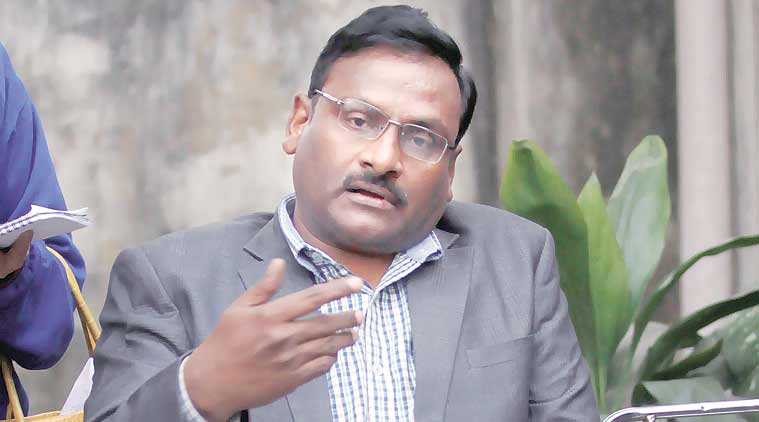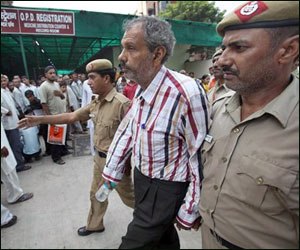Jailed for alleged Maoist link, DU professor GN Saibaba gets bail
Worsening health of G N Saibaba, charged under the UAPA for alleged Maoist links, was the main ground for his release.

Professor GN Saibaba
 Written by Aamir Khan, Indian Express | Mumbai | July 1, 2015
Written by Aamir Khan, Indian Express | Mumbai | July 1, 2015Wheelchair-bound Delhi University professor G N Saibaba has been granted bail after over a year, as the Bombay High Court Tuesday exercised powers to “protect” his fundamental rights. He has been ailing and will go to Delhi for treatment.
Worsening health of Saibaba, charged under the stringent Unlawful Activities (Prevention) Act for alleged Maoist links, was the main ground for his release.
“If extraordinary powers enshrined under Article 226 is not exercised, this court will be failing in its duty to protect the fundamental rights of professor G N Saibaba, professor of English at Delhi University. Therefore, this court is inclined to direct respondents (jail authorities) to release him for three months for medical treatment and support of his family,” Chief Justice Mohit Shah and Justice S B Shukre observed.
Saibaba has been in Nagpur Central Prison since his arrest in May 2014 by the Maharashtra Police, from the university campus. Now that he is allowed to go to Delhi, he can undergo treatment for degeneration of spine and other neurological ailments.
The HC felt he needed his family’s round-the clock assistance. He has been asked to furnish a personal bond of Rs 50,000. He has been asked to not keep any mode of communication, such as laptop or cellphones, at his house.Dr GN
Public Prosecutor Sandeep Shinde wanted these bail conditions to be imposed. He opposed the reprieve saying Saibaba is associated with the banned CPI (Maoist) and there was possibility of him tampering with evidence. Shinde argued that Saibaba’s bail had been rejected on three occasions. He submitted that the single judge of the Nagpur bench of the Bombay High Court had rejected the plea.
“It was after the sessions court refused him relief. This court cannot take suo motu cognisance in a PIL and grant him bail as it does not have jurisdiction. There is an alternate remedy available to him,” argued Shinde. He pointed that the hard disk retrieved from Saibaba’s house corroborated with evidence in memory cards gathered from a couple of accused who claimed getting it from Saibaba. They were supposed to deliver the memory cards to naxals,” said Shinde.
Activist Purnima Upadhyay, whose letter to the court highlighted Saibaba’s failing health, had pointed out difficulties faced by his family in getting him treated. His family stays in Delhi and his wife and brother have to travel frequently to meet him.
Upadhyay said when she visited Saibaba, she saw him being wheeled with assistance. He had dislocated his shoulder, besides having a crippled right hand due to spinal problems.
“He often gets muscle cramps. He has also been fainting. He said complications in his kidney and gall bladder led to urinal problems as he was on strong medication,” she said.
Allowing Saibaba’s brother and wife to meet him, a bench of Chief Justice Mohit Shah and Justice A K Menon had earlier directed prison authorities to shift the professor to a hospital of his choice. The HC had rapped the police for ‘working blindly’ and treating the ailing professor ‘like an animal’.
Senior counsel Gayatri Singh, appearing for the petitioner, said government facilities in Nagpur were inadequate to handle Saibaba’s case. Escalating medical cost, up to Rs 1 lakh, which the family had incurred was worrisome, she had said.


![Greek Prime Minister Alexis Tsipras has given the go-ahead on joining a pipeline from Russia to Europe via Turkey and Greece [Image: primeminister.gov.gr]](http://web.archive.org./web/20210122225049im_/https://i1.wp.com/thebricspost.com/wp-content/uploads/2015/06/CGWJ87fWgAAxmcB.jpg)


